Okay, fair enough. At some point I changed my location from listing my city in the US to simply "USA."Not fond of disclosing everything to internet data collectors. I keep them guessing with varied information.
You are using an out of date browser. It may not display this or other websites correctly.
You should upgrade or use an alternative browser.
You should upgrade or use an alternative browser.
What is the appeal of Lake, Cold, Low vis diving?
- Thread starter rexman24
- Start date
Please register or login
Welcome to ScubaBoard, the world's largest scuba diving community. Registration is not required to read the forums, but we encourage you to join. Joining has its benefits and enables you to participate in the discussions.
Benefits of registering include
- Ability to post and comment on topics and discussions.
- A Free photo gallery to share your dive photos with the world.
- You can make this box go away
Ross19966
Contributor
I did a boat dive charter in FL years ago. At the time I was diving in Maine year round. The viz on that FL trip that day was about 20ft. Just about everyone came back to the boat whining about "zero" viz. For me, 20ft was paradise. The next day was better at about 30ft and they were still whining, but diving.The way it was explained to me in training was this way and it makes a lot of sense. Sometimes diving in a quarry where it is usually low viz makes you a better diver. When you are in the tropics and conditions turn bad you are better able to handle those conditions, you learn to look for up close life and you don't panic. I have been on dives in low viz in Florida and people come up on the boat and say they didn't see anything. It's on those dives where I seem to have seen a lot more of the smaller marine life. Have fun and develop those skills.
Personally, I think low/zero viz should be a skill taught during the OW training. Certainly during AOW. I've been diving in Maine with fair weather vacation divers and witnessed the panic attacks when viz starts to close in on you. Have you ever been bumped from behind by something but couldn't tell what because of the viz?
MidOH
Banned
Yeah. On my 3rd dive we decended into silt. DM thumbed that quickly. We would have gone blindly into it as noobs, wondering if it was normal. It really wasn't too bad. I could still see my bubbles pointing up.
When we dived through nothing but blue, I kept my eyes on other divers to keep my imagination from freaking, until the bottom was visible.
Will find out about cold water in Ohio for the first time this summer. Taking a refresher with Columbus Scuba, then advanced open water in a quarry.
Quarry diving does look like a party. Camping onsite at one. Camping across the street from the other.
If a hood keeps me from getting sick, I'll be fine. I have fun in pools, so not every dive has to be a reef. But, if I go out in winter without a hat on, I get deathly ill really quick. I even have to keep a hat handy on warm water vacations if it's windy. I haven't invested in a drysuit yet, until I make it past this. No idea if I can even do cold water, but I've never had issues with swimming or snorkeling in cold water, ever.
Clear warm water like Roatan is awesome, but I'd like to dive between vacations as well, if possible.
When we dived through nothing but blue, I kept my eyes on other divers to keep my imagination from freaking, until the bottom was visible.
Will find out about cold water in Ohio for the first time this summer. Taking a refresher with Columbus Scuba, then advanced open water in a quarry.
Quarry diving does look like a party. Camping onsite at one. Camping across the street from the other.
If a hood keeps me from getting sick, I'll be fine. I have fun in pools, so not every dive has to be a reef. But, if I go out in winter without a hat on, I get deathly ill really quick. I even have to keep a hat handy on warm water vacations if it's windy. I haven't invested in a drysuit yet, until I make it past this. No idea if I can even do cold water, but I've never had issues with swimming or snorkeling in cold water, ever.
Clear warm water like Roatan is awesome, but I'd like to dive between vacations as well, if possible.
maj2
Contributor
I knew when I got certifies that I would be mainly a cold water diver. My family had a cottage on Lake Huron near Tobermory, and I knew I was going to be in shipwreck heaven!
I do not think anyone ever forgets their first view of the bow of the Arabia emerging from the dark when they approach the bow mooring block of the site.
The Ohio quarries are a closer drive for me now, and I tolerate them for practice. My first love in diving remains the wrecks of the Great Lakes.
I certainly do not complain when I get the chance to travel to a warm water destination, but I will never turn down the chance to dive in the snow!
I do not think anyone ever forgets their first view of the bow of the Arabia emerging from the dark when they approach the bow mooring block of the site.
The Ohio quarries are a closer drive for me now, and I tolerate them for practice. My first love in diving remains the wrecks of the Great Lakes.
I certainly do not complain when I get the chance to travel to a warm water destination, but I will never turn down the chance to dive in the snow!
It was like something out of a pirate zombie movie!I do not think anyone ever forgets their first view of the bow of the Arabia emerging from the dark when they approach the bow mooring block of the site.
I’ve read through some of these posts, and want you to know that I started diving Oregon’s lakes, rivers and estuaries in 1959. I’ve dived coral in Okinawa and Bermuda, Florida and the islands of California. At one point in the U.S. Air Force, we dove a lot of warm water. But I am not a travel diver. Why? Well, I am fully satisfied with Oregon diving. There is a lot to see if people would look. I’ve seen lampreys spawning, salmon and steelhead in the wild, red-sided shiners spawning, mussels reproducing by giving off conglotamate for fish to feed upon, thereby putting the glochidia in their gills, came upon 6 foot and 8 foot sturgeon, and watched a very small hydra feeding on stuff from the current.
I do this with some specialized equipment, including older-style double hose regulators (I have a collection of both double hose and so-called single hose regulators), a semi-closed wet suit, hood, boots, gloves, and a float (yes, I dive with a float as I usually dive solo, and if something were to happen want my spot marked so rescue divers won’t have to look long to find me; I’m now 77 years old). The float also protects me from fishermen’s jet boats when I dive High Rocks on the Clackamas River. One piece of equipment is a SeawiscopeEY, which I picked up in Hong Kong and really helps looking at small to tiny things underwater.
I am an underwater photographer from the old school, using two Nikonos II cameras, and older Canon F-1N in an Ikelite housing (there are film cameras), and now a Canon digital camera in a Canon case, and got into video with a GoPro. I have videos which explain to others the things I see. You can see one of my videos below.
I also have a car wreck to dive on at High Rocks, which has been there for decades.
 vintagescuba.proboards.com
vintagescuba.proboards.com
Now, I’d like to broach a topic about dive travel that may not be popular; this industry is contributing highly to global warming and climate change. By defining “good diving” as diving in clear, warm tropical waters, and insisting that divers to get the entire experience need to go do diving destinations, the dive travel industry is promoting activities which disperse a huge amount of CO2 into the atmosphere by jet travel and boat travel.
I’m here to tell you that you can dive locally and find great fun in that too. Diving is more than seeing sharks, or tropical coral reefs. It is the feeling of weightlessness in getting underwater; it is the adventure of seeing what is around you that you cannot see any other way; diving is the wonder of enjoying and experiencing the entire ecosystem around us; the challenge of diving in current and sometimes drifting sideways under a river rapid; it is looking at newly hatched fish fry feeding right in front of our eyes; seeing the small creatures, such an crawdads (crayfish) working to remove the bodies of dead lampreys from the river; it is developing new equipment designs for underwater swimming and new techniques to make divers more efficient swimming in the waters; and it is simply playing with ducks by swimming under them holding your breath until you finally do spook them into flight.
My dive sites are 1/2 and 3/4 hour drive from my house. And I see things no one else sees. Why? Because they aren’t looking.
SeaRat
I do this with some specialized equipment, including older-style double hose regulators (I have a collection of both double hose and so-called single hose regulators), a semi-closed wet suit, hood, boots, gloves, and a float (yes, I dive with a float as I usually dive solo, and if something were to happen want my spot marked so rescue divers won’t have to look long to find me; I’m now 77 years old). The float also protects me from fishermen’s jet boats when I dive High Rocks on the Clackamas River. One piece of equipment is a SeawiscopeEY, which I picked up in Hong Kong and really helps looking at small to tiny things underwater.
I am an underwater photographer from the old school, using two Nikonos II cameras, and older Canon F-1N in an Ikelite housing (there are film cameras), and now a Canon digital camera in a Canon case, and got into video with a GoPro. I have videos which explain to others the things I see. You can see one of my videos below.
I also have a car wreck to dive on at High Rocks, which has been there for decades.
Challenge, Name this Submerged SUV | Vintage Scuba Diving Community Forum
Here is a dive log entry from a 2010 dive:
Now, I’d like to broach a topic about dive travel that may not be popular; this industry is contributing highly to global warming and climate change. By defining “good diving” as diving in clear, warm tropical waters, and insisting that divers to get the entire experience need to go do diving destinations, the dive travel industry is promoting activities which disperse a huge amount of CO2 into the atmosphere by jet travel and boat travel.
I’m here to tell you that you can dive locally and find great fun in that too. Diving is more than seeing sharks, or tropical coral reefs. It is the feeling of weightlessness in getting underwater; it is the adventure of seeing what is around you that you cannot see any other way; diving is the wonder of enjoying and experiencing the entire ecosystem around us; the challenge of diving in current and sometimes drifting sideways under a river rapid; it is looking at newly hatched fish fry feeding right in front of our eyes; seeing the small creatures, such an crawdads (crayfish) working to remove the bodies of dead lampreys from the river; it is developing new equipment designs for underwater swimming and new techniques to make divers more efficient swimming in the waters; and it is simply playing with ducks by swimming under them holding your breath until you finally do spook them into flight.
My dive sites are 1/2 and 3/4 hour drive from my house. And I see things no one else sees. Why? Because they aren’t looking.
SeaRat
Attachments
-
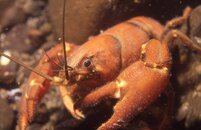 EF7F0311-0609-43FF-BA9E-17925A9D3CDF.jpeg74.4 KB · Views: 79
EF7F0311-0609-43FF-BA9E-17925A9D3CDF.jpeg74.4 KB · Views: 79 -
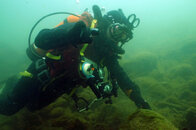 1894CA8C-8900-4671-A205-ACD4794D2688.jpeg72.7 KB · Views: 68
1894CA8C-8900-4671-A205-ACD4794D2688.jpeg72.7 KB · Views: 68 -
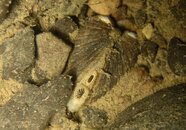 5FCA3356-DE15-41E0-84EE-349894B5170B.jpeg125.1 KB · Views: 67
5FCA3356-DE15-41E0-84EE-349894B5170B.jpeg125.1 KB · Views: 67 -
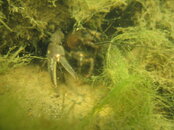 229F0D84-7BB0-40B8-8655-186EE632544D.jpeg90.1 KB · Views: 73
229F0D84-7BB0-40B8-8655-186EE632544D.jpeg90.1 KB · Views: 73 -
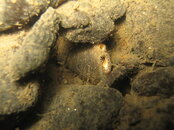 6AD43CAB-485A-4EC1-97A7-0FCA798475EB.jpeg108 KB · Views: 72
6AD43CAB-485A-4EC1-97A7-0FCA798475EB.jpeg108 KB · Views: 72 -
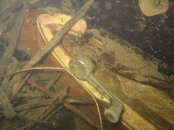 D385982A-E0BD-4266-9412-413D6ADA10E3.jpeg109.7 KB · Views: 69
D385982A-E0BD-4266-9412-413D6ADA10E3.jpeg109.7 KB · Views: 69 -
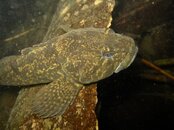 6E60F69C-BF43-48CE-8EC6-D434841F9F72.jpeg96.8 KB · Views: 70
6E60F69C-BF43-48CE-8EC6-D434841F9F72.jpeg96.8 KB · Views: 70 -
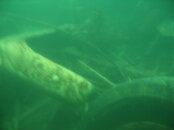 69DC538C-3E28-4FE6-AC96-7D4FF5697A93.jpeg29.9 KB · Views: 75
69DC538C-3E28-4FE6-AC96-7D4FF5697A93.jpeg29.9 KB · Views: 75 -
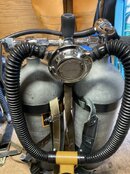 FDF1AC0D-9B1C-4D93-AF66-F4A184687658.jpeg117.8 KB · Views: 83
FDF1AC0D-9B1C-4D93-AF66-F4A184687658.jpeg117.8 KB · Views: 83 -
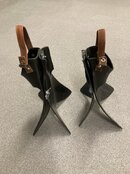 10927B32-069C-4AF2-B138-9FA2BFCA513F.jpeg158.4 KB · Views: 89
10927B32-069C-4AF2-B138-9FA2BFCA513F.jpeg158.4 KB · Views: 89 -
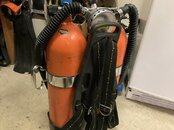 3E7EA855-BFFA-4796-A6E9-70237B07804D.jpeg83.9 KB · Views: 76
3E7EA855-BFFA-4796-A6E9-70237B07804D.jpeg83.9 KB · Views: 76 -
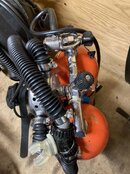 61DB7883-290A-492C-8986-4B39B50E734B.jpeg115.9 KB · Views: 75
61DB7883-290A-492C-8986-4B39B50E734B.jpeg115.9 KB · Views: 75 -
 18F46A9E-1BAF-4F14-9CB1-E7565192002E.jpeg88.7 KB · Views: 81
18F46A9E-1BAF-4F14-9CB1-E7565192002E.jpeg88.7 KB · Views: 81 -
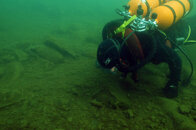 36932531-E801-46A1-81FE-3578C1BC292E.jpeg81.5 KB · Views: 74
36932531-E801-46A1-81FE-3578C1BC292E.jpeg81.5 KB · Views: 74 -
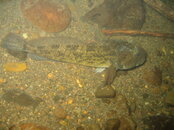 59BE9865-ED70-4F11-B50F-581EA8D7E609.jpeg112.7 KB · Views: 72
59BE9865-ED70-4F11-B50F-581EA8D7E609.jpeg112.7 KB · Views: 72
Quarry diving is kind of like playing Dark Souls games. The punishment is its own rewardMaybe someone can explain it to me.
I am a vacation, warm water diver.
I like it because there are so many interesting things to see.
So what is the appeal of diving in lakes, quarries, cold, low vis waters?
Is it just the thrill of the diving itself?
Is it the challenge presented by the conditions?
Maybe sometimes there is something interesting to see?
Joking aside, I went a couple years where my schedule only allowed for quarry dives since they were much more economical on the timeside of the house than getting all the way to the ocean. I certainly wasn't going to dive in murky north carolina river water, so cold quarries it was. The plus side to quarries is that there's usually alot of cool stuff down at the bottom. Old mining equipment, rock crushers, sunken buses, trucks left behind etc. They can be really good places to work on technique (buoyancy, navigation, somewhat less dangerous entires into wrecks) as well.
Vertologist
Registered
Well said @John C. Ratliff! So far all my diving (little as it has been) has been cold water, lakes, mostly small things in mine pits (but some huge northern pike fish!), but once (so far) Lake Superior for magnificent cliffs and canyons to sail over and into, and the odd wreck to explore. I do hope to get to the tropics one day, but the carbon emissions weigh heavily on me, too, especially with carbon mitigation not worked out well yet. I enjoy watching the swarms of bluegills in the lakes and the submerged trees rising like skeletons out of the gloom. There are things to see.I’ve read through some of these posts, and want you to know that I started diving Oregon’s lakes, rivers and estuaries in 1959. I’ve dived coral in Okinawa and Bermuda, Florida and the islands of California. At one point in the U.S. Air Force, we dove a lot of warm water. But I am not a travel diver. Why? Well, I am fully satisfied with Oregon diving. There is a lot to see if people would look. I’ve seen lampreys spawning, salmon and steelhead in the wild, red-sided shiners spawning, mussels reproducing by giving off conglotamate for fish to feed upon, thereby putting the glochidia in their gills, came upon 6 foot and 8 foot sturgeon, and watched a very small hydra feeding on stuff from the current.
I do this with some specialized equipment, including older-style double hose regulators (I have a collection of both double hose and so-called single hose regulators), a semi-closed wet suit, hood, boots, gloves, and a float (yes, I dive with a float as I usually dive solo, and if something were to happen want my spot marked so rescue divers won’t have to look long to find me; I’m now 77 years old). The float also protects me from fishermen’s jet boats when I dive High Rocks on the Clackamas River. One piece of equipment is a SeawiscopeEY, which I picked up in Hong Kong and really helps looking at small to tiny things underwater.
I am an underwater photographer from the old school, using two Nikonos II cameras, and older Canon F-1N in an Ikelite housing (there are film cameras), and now a Canon digital camera in a Canon case, and got into video with a GoPro. I have videos which explain to others the things I see. You can see one of my videos below.
I also have a car wreck to dive on at High Rocks, which has been there for decades.
Challenge, Name this Submerged SUV | Vintage Scuba Diving Community Forum
Here is a dive log entry from a 2010 dive:vintagescuba.proboards.com
Now, I’d like to broach a topic about dive travel that may not be popular; this industry is contributing highly to global warming and climate change. By defining “good diving” as diving in clear, warm tropical waters, and insisting that divers to get the entire experience need to go do diving destinations, the dive travel industry is promoting activities which disperse a huge amount of CO2 into the atmosphere by jet travel and boat travel.
I’m here to tell you that you can dive locally and find great fun in that too. Diving is more than seeing sharks, or tropical coral reefs. It is the feeling of weightlessness in getting underwater; it is the adventure of seeing what is around you that you cannot see any other way; diving is the wonder of enjoying and experiencing the entire ecosystem around us; the challenge of diving in current and sometimes drifting sideways under a river rapid; it is looking at newly hatched fish fry feeding right in front of our eyes; seeing the small creatures, such an crawdads (crayfish) working to remove the bodies of dead lampreys from the river; it is developing new equipment designs for underwater swimming and new techniques to make divers more efficient swimming in the waters; and it is simply playing with ducks by swimming under them holding your breath until you finally do spook them into flight.
My dive sites are 1/2 and 3/4 hour drive from my house. And I see things no one else sees. Why? Because they aren’t looking.
SeaRat
- Messages
- 16,637
- Reaction score
- 5,409
- # of dives
- 1000 - 2499
Yes, but you take the OW course when & where it is offered. We can get low or good viz here in NS, but the shop can't schedule OW (or AOW) courses bases on the viz that day obviously.I did a boat dive charter in FL years ago. At the time I was diving in Maine year round. The viz on that FL trip that day was about 20ft. Just about everyone came back to the boat whining about "zero" viz. For me, 20ft was paradise. The next day was better at about 30ft and they were still whining, but diving.
Personally, I think low/zero viz should be a skill taught during the OW training. Certainly during AOW. I've been diving in Maine with fair weather vacation divers and witnessed the panic attacks when viz starts to close in on you. Have you ever been bumped from behind by something but couldn't tell what because of the viz?
Thank you for your input. Your diving sounds quite interesting. The NW is a beautiful area, half my family is from Tacoma so I've spent considerable time there, but was not a diver at the time.I’ve read through some of these posts, and want you to know that I started diving Oregon’s lakes, rivers and estuaries in 1959. I’ve dived coral in Okinawa and Bermuda, Florida and the islands of California. At one point in the U.S. Air Force, we dove a lot of warm water. But I am not a travel diver. Why? Well, I am fully satisfied with Oregon diving. There is a lot to see if people would look. I’ve seen lampreys spawning, salmon and steelhead in the wild, red-sided shiners spawning, mussels reproducing by giving off conglotamate for fish to feed upon, thereby putting the glochidia in their gills, came upon 6 foot and 8 foot sturgeon, and watched a very small hydra feeding on stuff from the current.
I do this with some specialized equipment, including older-style double hose regulators (I have a collection of both double hose and so-called single hose regulators), a semi-closed wet suit, hood, boots, gloves, and a float (yes, I dive with a float as I usually dive solo, and if something were to happen want my spot marked so rescue divers won’t have to look long to find me; I’m now 77 years old). The float also protects me from fishermen’s jet boats when I dive High Rocks on the Clackamas River. One piece of equipment is a SeawiscopeEY, which I picked up in Hong Kong and really helps looking at small to tiny things underwater.
I am an underwater photographer from the old school, using two Nikonos II cameras, and older Canon F-1N in an Ikelite housing (there are film cameras), and now a Canon digital camera in a Canon case, and got into video with a GoPro. I have videos which explain to others the things I see. You can see one of my videos below.
I also have a car wreck to dive on at High Rocks, which has been there for decades.
Challenge, Name this Submerged SUV | Vintage Scuba Diving Community Forum
Here is a dive log entry from a 2010 dive:vintagescuba.proboards.com
Now, I’d like to broach a topic about dive travel that may not be popular; this industry is contributing highly to global warming and climate change. By defining “good diving” as diving in clear, warm tropical waters, and insisting that divers to get the entire experience need to go do diving destinations, the dive travel industry is promoting activities which disperse a huge amount of CO2 into the atmosphere by jet travel and boat travel.
I’m here to tell you that you can dive locally and find great fun in that too. Diving is more than seeing sharks, or tropical coral reefs. It is the feeling of weightlessness in getting underwater; it is the adventure of seeing what is around you that you cannot see any other way; diving is the wonder of enjoying and experiencing the entire ecosystem around us; the challenge of diving in current and sometimes drifting sideways under a river rapid; it is looking at newly hatched fish fry feeding right in front of our eyes; seeing the small creatures, such an crawdads (crayfish) working to remove the bodies of dead lampreys from the river; it is developing new equipment designs for underwater swimming and new techniques to make divers more efficient swimming in the waters; and it is simply playing with ducks by swimming under them holding your breath until you finally do spook them into flight.
My dive sites are 1/2 and 3/4 hour drive from my house. And I see things no one else sees. Why? Because they aren’t looking.
SeaRat
I have resolved the global warming conundrum by moving to the Philippines(my asawa is a Filipina, were making up for 15 years she spent in the US). I now can do some of the best macro diving in the world 300 meters from my door and the other 20 or so great spots in the Philippines are an easy reach.
We have also massively reduced our carbon footprint from a 3bdr house and 2 cars in the US, to a 1 bdr house and 1 sidecar scooter in the Philippines. Happy diving!
.
Similar threads
- Replies
- 15
- Views
- 1,505
- Replies
- 44
- Views
- 3,201
- Replies
- 27
- Views
- 2,399



